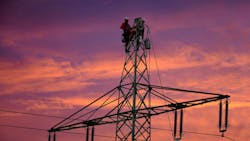Line Worker, Electrician Unions Issue COVID-19 Advice for Utility Workers
The uncertainty surrounding the ongoing COVID-19 pandemic has been deeply unsettling to nearly every industry, and the International Brotherhood of Electrical Workers (IBEW) and its partners at the National Electrical Contractors Association (NECA) signed an emergency agreement to help construction workers and contractors navigate these turbulent times.
The NECA/IBEW National Disease Emergency Response Agreement says that is an employee reports contact with another person who is reasonably believed to have contracted coronavirus, returned from a CDC-declared high-risk country or presents symptoms associated with coronavirus, the employer should remove the employee from the job site and require them to obtain a doctor’s release before returning to work.
“We understand the anxiety and uncertainty all of our members and contractors are feeling right now, and we hope this agreement provides a measure of stability as we face this new reality,” said International President Lonnie R. Stephenson. “Beating any public health emergency like COVID-19 requires all of us to make sacrifices, but being a part of a union means we make these tough decisions with our employers and don’t have them forced on us,” he said. “We’ll reevaluate this agreement every 30 days and keep you updated as we move forward.
If an employee is confirmed to have coronavirus, the employer should take steps to notify every employee who was in contact with the sickened worker and take actions to prevent further spread of infection.
If an employee reasonably believes another has met one or more of the above conditions, the employee should report it as soon as possible. The employer should then follow all appropriate guidelines and protocols to ensure a safe workplace.
The IBEW continues, saying there should be no adverse action taken against an employee who refuses to come to a job site so long as the employee believes there is an imminent danger and a reasonable person would agree there is danger of contracting coronavirus at the job site. Further, there should be no retaliation against a worker who has been quarantined or advised to self-quarantine due to possible exposure.
In the event a job site is closed down by an employer or appropriate authority, the employer shall be allowed to temporarily furlough the employees assigned to the job site. Employers should not contest any unemployment claims filed by furloughed employees as a result of a closed job site or who have refused to show up for work out of a genuine belief that the work site will not be safe, or who have been quarantined, or advised to self-quarantine.
Further, these employees should be permitted to return to their original jobs upon resumption of work and/or their ability to return without the need for a referral process, whether or not employees signed their local union’s out-of-work list.
The IBEW also advises workers in Canada to follow the advice of their local unions and local authorities.
About the Author
Jeff Postelwait
Managing Editor
Jeff Postelwait is a writer and editor with a background in newspapers and online editing who has been writing about the electric utility industry since 2008. Jeff is senior editor for T&D World magazine and sits on the advisory board of the T&D World Conference and Exhibition. Utility Products, Power Engineering, Powergrid International and Electric Light & Power are some of the other publications in which Jeff's work has been featured. Jeff received his degree in journalism news editing from Oklahoma State University and currently operates out of Oregon.
